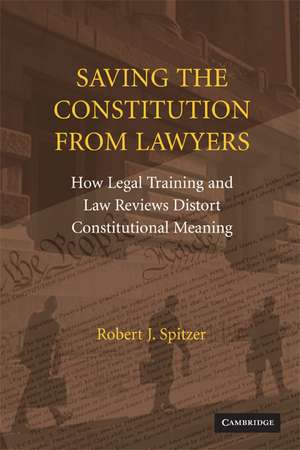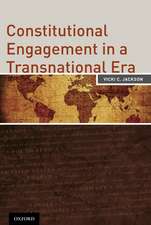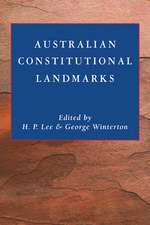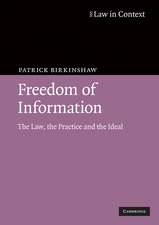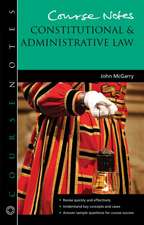Saving the Constitution from Lawyers: How Legal Training and Law Reviews Distort Constitutional Meaning
Autor Robert J. Spitzeren Limba Engleză Paperback – 6 apr 2008
| Toate formatele și edițiile | Preț | Express |
|---|---|---|
| Paperback (1) | 248.39 lei 6-8 săpt. | |
| Cambridge University Press – 6 apr 2008 | 248.39 lei 6-8 săpt. | |
| Hardback (1) | 390.20 lei 6-8 săpt. | |
| Cambridge University Press – 6 apr 2008 | 390.20 lei 6-8 săpt. |
Preț: 248.39 lei
Nou
Puncte Express: 373
Preț estimativ în valută:
47.53€ • 49.56$ • 39.51£
47.53€ • 49.56$ • 39.51£
Carte tipărită la comandă
Livrare economică 20 martie-03 aprilie
Preluare comenzi: 021 569.72.76
Specificații
ISBN-13: 9780521721721
ISBN-10: 0521721725
Pagini: 206
Dimensiuni: 152 x 228 x 15 mm
Greutate: 0.39 kg
Ediția:1
Editura: Cambridge University Press
Colecția Cambridge University Press
Locul publicării:New York, United States
ISBN-10: 0521721725
Pagini: 206
Dimensiuni: 152 x 228 x 15 mm
Greutate: 0.39 kg
Ediția:1
Editura: Cambridge University Press
Colecția Cambridge University Press
Locul publicării:New York, United States
Cuprins
1. The logic, and illogic, of law; 2. The law journal breeding ground; 3. The inherent item veto; 4. The unitary executive and the commander-in-chief power; 5. The second amendment; 6. Conclusion.
Recenzii
"Fair, fearless, and ferocious, Bob Spitzer has done it again. In Saving the Constitution from Lawyers, he dissects law journals run by law students - and demolishes their one-sided and poorly supported briefs for the line-item veto, the unitary theory of the executive, and the right to bear arms."
--Glenn Altschuler, Litwin Professor and Dean, Cornell University
"No one will read law review articles in the same way after reading Spitzer. Let's hope that no one will write them in the same way either. This book is a tour de force, and should be required reading for every law student, legal scholar, and student of constitutional and public law."
--Richard M. Pious, Adolph and Effie Ochs Professor, Department of Political Science, Barnard College Graduate School of Arts and Sciences, Columbia University
"In this compelling and erudite work, Robert Spitzer skewers the legal profession and legal (mis) education with skill, wit and elegance. This brilliant and insightful indictment of the profession is a clarion call for citizens to recapture the essence of the Constitution that has been lost, stolen and perverted by so-called “legal authorities”. Spitzer asks us to be wary of constitutional interpretation as filtered through the decidedly unbalanced lens of a profession accustomed to adversarial advocacy as opposed to a systematic search for truth. This book is certain to give the legal profession a first-rate headache."
--Michael A. Genovese, Loyola Chair of Leadership, Loyola Marymount
University, Author of Memo to a New President
"American law schools are filled with smart students and even smarter scholars. Yet it is hardly a secret that the basic medium of scholarly discourse--the law review--repeatedly trades in a debased currency, in part because scholars over-argue like the future lawyers they are training, and in part because their students lack the intellectual credentials to evaluate legal scholarship. Nowhere is the gap between pretension and performance more evident than in the realm of constitutional law, and Robert Spitzer explains why."
--Jack Rakove, W. R. Coe Professor of History and American Studies & Professor of Political Science, Stanford University, Pulitzer Prize for Original Meanings: Politics and Ideas in the Making of the Constitution
"Spitzer’s critique of law reviews is balanced by his respect for lawyers, their function in the American system of justice, and his reverence for the Constitution. But just as valuable as his analysis of the systemic problems with law journals is his impressive, scholarly analysis of three major contemporary constitutional issues: the item veto, the Second Amendment, and the “unitary executive” theory. Spitzer’s book will be controversial, but his constitutional analysis will remain valuable to everyone who wants to understand these important Constitutional issues."
--James Pfiffner, Professor of Public Policy, George Mason University
"I devoted the Labor Day weekend to reading Saving the Constitution from Lawyers. It was time well spent. I have no serious disagreement with anything in the book. ...thesis is sound, ...proof for it is overwhelming. I agree that all who write for law reviews, whether students, faculty members, or others, should possess the skills of scholarship and ideally formal training in scholarship. ...I hope the book is taken seriously by law school deans and faculty members, judges, lawyers, and constitutional scholars generally. It is an important and timely work."
--David Danelski, Professor of Law and Political Science, Yale University
"The dominant theme of this little book is that law school law review journals have a publishing process that sometimes results in judges and justices misinterpreting the Constitution....Recommended."
--D. S. Mann, College of Charleston, CHOICE
"...Spitzer has staked out his position in these fascinating debates, revealing for us how political movements throw off generations of precedent and historical meaning and take on a new cloak of constitutional authority."
--Patrick Schmidt, Department of Political Science, Macalester College, The Law and Politics Book Review
"...In Saving the Constitution from Lawyers, political scientist Robert J. Spitzer presents a sharp critique of the “wayward constitutional theorizing” (p. 177) published in law journals...Professor Spitzer contributes detailed case studies showing that a lack of rigor in law schools turned laughably bad arguments into law — “and no one is laughing now” (p. 128)."
--HARVARD LAW REVIEW [Vol. 122:1279]
--Glenn Altschuler, Litwin Professor and Dean, Cornell University
"No one will read law review articles in the same way after reading Spitzer. Let's hope that no one will write them in the same way either. This book is a tour de force, and should be required reading for every law student, legal scholar, and student of constitutional and public law."
--Richard M. Pious, Adolph and Effie Ochs Professor, Department of Political Science, Barnard College Graduate School of Arts and Sciences, Columbia University
"In this compelling and erudite work, Robert Spitzer skewers the legal profession and legal (mis) education with skill, wit and elegance. This brilliant and insightful indictment of the profession is a clarion call for citizens to recapture the essence of the Constitution that has been lost, stolen and perverted by so-called “legal authorities”. Spitzer asks us to be wary of constitutional interpretation as filtered through the decidedly unbalanced lens of a profession accustomed to adversarial advocacy as opposed to a systematic search for truth. This book is certain to give the legal profession a first-rate headache."
--Michael A. Genovese, Loyola Chair of Leadership, Loyola Marymount
University, Author of Memo to a New President
"American law schools are filled with smart students and even smarter scholars. Yet it is hardly a secret that the basic medium of scholarly discourse--the law review--repeatedly trades in a debased currency, in part because scholars over-argue like the future lawyers they are training, and in part because their students lack the intellectual credentials to evaluate legal scholarship. Nowhere is the gap between pretension and performance more evident than in the realm of constitutional law, and Robert Spitzer explains why."
--Jack Rakove, W. R. Coe Professor of History and American Studies & Professor of Political Science, Stanford University, Pulitzer Prize for Original Meanings: Politics and Ideas in the Making of the Constitution
"Spitzer’s critique of law reviews is balanced by his respect for lawyers, their function in the American system of justice, and his reverence for the Constitution. But just as valuable as his analysis of the systemic problems with law journals is his impressive, scholarly analysis of three major contemporary constitutional issues: the item veto, the Second Amendment, and the “unitary executive” theory. Spitzer’s book will be controversial, but his constitutional analysis will remain valuable to everyone who wants to understand these important Constitutional issues."
--James Pfiffner, Professor of Public Policy, George Mason University
"I devoted the Labor Day weekend to reading Saving the Constitution from Lawyers. It was time well spent. I have no serious disagreement with anything in the book. ...thesis is sound, ...proof for it is overwhelming. I agree that all who write for law reviews, whether students, faculty members, or others, should possess the skills of scholarship and ideally formal training in scholarship. ...I hope the book is taken seriously by law school deans and faculty members, judges, lawyers, and constitutional scholars generally. It is an important and timely work."
--David Danelski, Professor of Law and Political Science, Yale University
"The dominant theme of this little book is that law school law review journals have a publishing process that sometimes results in judges and justices misinterpreting the Constitution....Recommended."
--D. S. Mann, College of Charleston, CHOICE
"...Spitzer has staked out his position in these fascinating debates, revealing for us how political movements throw off generations of precedent and historical meaning and take on a new cloak of constitutional authority."
--Patrick Schmidt, Department of Political Science, Macalester College, The Law and Politics Book Review
"...In Saving the Constitution from Lawyers, political scientist Robert J. Spitzer presents a sharp critique of the “wayward constitutional theorizing” (p. 177) published in law journals...Professor Spitzer contributes detailed case studies showing that a lack of rigor in law schools turned laughably bad arguments into law — “and no one is laughing now” (p. 128)."
--HARVARD LAW REVIEW [Vol. 122:1279]
Notă biografică
Descriere
This book is a sweeping indictment of the legal profession in the realm of constitutional interpretation.
